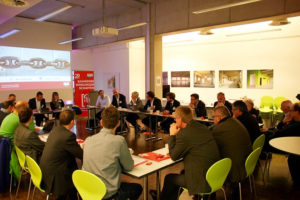eco Association starts Competence Group Blockchain
Cologne, 13 December 2016 – How will Blockchain technology change our world? Around 25 experts from the industry and research met at the inaugural meeting of the newest eco Competence Group, Blockchain, on 13 December 2016 in Cologne.

Blockchain technology, new business models and acceptance factors were in the focus at the inaugural meeting. eco – Association of the Internet Industry e. V. Director Oliver Süme welcomed the participants and spelled out the objectives of the new Competence Group: “Blockchain technology is an excellent match for eco. We want to be a part of the development of this cross-sectional technology, which will impact many areas of industry, and take a lead in shaping it.” Lars Steffen, from Member Services, explained to the participants the working style of competence groups in the eco Association. He announced the first official meeting of the Competence Group Blockchain on 9 February 2017 in Frankfurt am Main.


Approaches to solutions for many sectors
In a detailed specialist presentation, Prof. Dr. Wolfgang Prinz, Vice Chair of the Fraunhofer Institute for Applied Information Technology FIT, gave an overview of the chances and the potential of Blockchain. He explained the five technical components and showed how the validation algorithms of Blockchain can replace central stakeholders. He gave food for thought for new business concepts – for example, by means of the platform Ethereum. This distributed system based on Blockchain technology makes Smart Contracts – self-executable and programmed contracts. In the Internet of Things (IoT), Smart Contracts make transactions dependent on pre-programmed conditions, in order, for example, to trigger automatic micro payments for sensor data. In short, Wolfgang Prinz postulated a great number of possibilities for implementation in various sectors. But there are, in practice, perhaps more questions than answers, in particular regarding the speed and scalability of the solution.


Secure transactions without intermediaries
The lawyer Stephan Zimprich introduced himself to the participants as Leader of the new Competence Group Blockchain. He spoke about regulatory and legal issues for Blockchain technology, gave an overview of new business ideas, and explained where successful models are possible: Many new possibilities for applications are developing in FinTech (financial technology) companies. Banks are testing Blockchain for the trustworthy exchange of values and the insurance industry is examining practical applications, for example for the autonomous organization of processes. In particular, Digital Rights Management – the administration of rights and licenses – could be simplified with Blockchain: With an attachment to a Blockchain transaction, it is possible to prove, unambiguously and without intermediaries, who first had an idea worthy of protection.


Acceptance factors for Blockchain
After a coffee break, Prof. Dr. Georg Rainer Hofmann, Leader of the Competence Group E-Commerce at eco, took the floor and discussed acceptance factors for Blockchain. He mentioned several critical points, such as the time to implement valid transactions, which – at around 10 minutes for securities transactions – is too long. Prof. Hofmann also spoke about possible operating errors, such as classic accounting errors, which cannot be rectified by a central authority. In addition, there is still no recognition of Blockchain in the legal system: The legislator is faced with the question of whether and how a situation of decentralized cryptographic documentation is to be recognized. From the legal perspective, the integration of Blockchain technology into the existing legal system is an exciting challenge. Making a contribution to clarifying this should be one of the important tasks of the Competence Group Blockchain, in his opinion, for example through explanatory documents.


Discussion and next steps
In the subsequent round of discussions, the participants talked about the objectives of the Competence Group: Depending on the possible applications in various sectors, the group would like to answer questions regarding trust, technology and legal framework conditions. Many participants desired explanations of practical application cases that illustrate the perspectives of Blockchain technology. The benefits of the technology should be in the foreground of the work of the Competence Group. A concrete question was raised by Dr. Bettina Horster, Leader of the Competence Group Mobile in the eco association: Can Blockchain technology help to solve the challenges of an aging society? She described her project “Age-appropriate living in the neighborhood” and how sensor data can be distributed by means of Smart Contracts in a Blockchain solution.
In closing the event, Stephan Zimprich talked about the next steps. These include the preparation of a base paper, in order to create a unified understanding of Blockchain technology and the tasks of the Competence Group. The formulation of the benefits of the technology and the analysis of the application areas were also given by the participants as objectives of the next meeting of the Competence Group on 9 February 2017 in Frankfurt am Main.
Further Information




